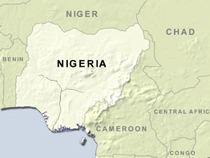-
(单词翻译:双击或拖选)
By Gilbert da Costa
Abuja
07 August 2006
Hundreds of residents of Nigeria's disputed Bakassi peninsula have held an "independence" ceremony to highlight opposition1 to the government's plan to hand over the oil-rich region to Cameroon.
--------
 |
||
Nigerian troops are to begin pulling out of the area this month, paving the way for a full transfer within two years.
Under an agreement reached by the leaders of Cameroon and Nigeria last June, those living in the area can choose to leave the territory, or stay and become Cameroonian citizens, or Nigerians residing in Cameroonian territory.
Most of the area's 300,000 residents have rejected these options, and would prefer the status quo to remain. The Bakassi Self Determination Movement, which convened3 the so-called independence ceremony on Sunday, said it had no choice but to take the destiny of the embattled people in hand.
Femi Falana, a Lagos-based lawyer, who has filed a legal challenge to the proposed handover on behalf of the Bakassi people, says a declaration of independence is justified4 because, he says, the handover deal is illegal.
"A treaty cannot have the force of law in Nigeria, unless it has been enacted5 into law by the National Assembly," he said. "Secondly6, Bakassi local government remains7 part of Nigeria under the constitution. Furthermore, these people are saying, there has been no alternative arrangement s for them, in terms of accommodation and schools for their children and the rest of them. And, so, I think, to that extent, I think, they have the right to declare where they want to belong to."
An Abuja court will this week begin hearing the legal challenge filed last month by Falana. Bakassi residents are asking the court to declare the handover a violation8 of the Nigerian constitution.
In 2002, the International Court of Justice ruled that the oil-rich peninsula belonged to Cameroon. The Nigerian government, which accepted the verdict, has come under profound criticism especially from the Nigerians residing on the peninsula.
 收听单词发音
收听单词发音
1
opposition

|
|
| n.反对,敌对 | |
参考例句: |
|
|
|
2
inadequate

|
|
| adj.(for,to)不充足的,不适当的 | |
参考例句: |
|
|
|
3
convened

|
|
| 召开( convene的过去式 ); 召集; (为正式会议而)聚集; 集合 | |
参考例句: |
|
|
|
4
justified

|
|
| a.正当的,有理的 | |
参考例句: |
|
|
|
5
enacted

|
|
| 制定(法律),通过(法案)( enact的过去式和过去分词 ) | |
参考例句: |
|
|
|
6
secondly

|
|
| adv.第二,其次 | |
参考例句: |
|
|
|
7
remains

|
|
| n.剩余物,残留物;遗体,遗迹 | |
参考例句: |
|
|
|
8
violation

|
|
| n.违反(行为),违背(行为),侵犯 | |
参考例句: |
|
|
|















